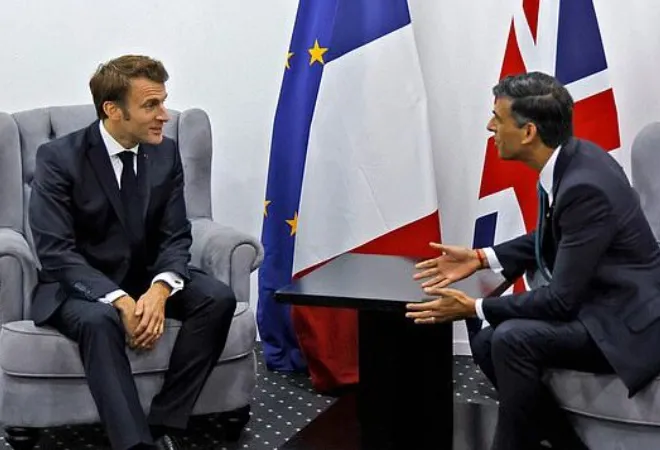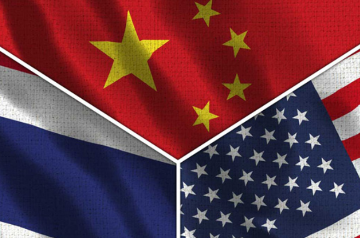
France-UK relations have been characterised by a long and complex history of discord intertwined with cooperation—from being enemies during the so-called
Hundred Years' War to being allies during the First and Second World Wars. The deep-rooted rivalry and heavy weight of the past continue to loom over the current relationship, manifesting itself in various ways, despite shared values.
Today, Anglo-French ties governed by the
Entente Cordiale—a series of agreements that were established in 1904 to improve relations and end 1,000 years of conflict—are characterised by outright hostility.
Ever since Britain voted to leave the European Union (EU) in 2016, the messy divorce has led to a series of intensely heated issues between Britain and France over fishing rights, cross-Channel migration, the Northern Ireland border, and nuclear submarines.
A long-standing bone of contention has been the issue of cross-Channel illegal migration. Policing of the UK-France border has traditionally been governed by the 2003
Le Touquet agreement. However, in November 2021, 27 people
died attempting to reach the UK on small boats from France, with Britain and France holding each other
responsible for the tragedy. As a consequence of the suspension of the pre-Brexit
Dublin Regulation that allowed Britain to return migrants to other European countries; in 2022, a record 40,000 people dangerously
crossed the English Channel into Britain, costing the UK government
6.8 million euros a day in accommodation costs—a dramatic increase from the 300 people that
crossed over in 2018.
Skirmishes over fishing rights erupted even in 2018 when similar instances of sea clashes between French and British fishermen, famously referred to as the “Great Scallop War”, took place.
Another rankling dispute involved fishing licenses in
Jersey—a British Crown dependency channel island that relies on France for its power supply. Skirmishes over fishing rights erupted even in 2018 when similar instances of sea clashes between French and British fishermen, famously referred to as the “Great Scallop War”, took place. But tensions escalated to new levels right after the G7 summit in May 2021 when France and Britain sent gunboats in a
spat over shellfish, and France threatened to cut off Jersey’s power supply in retaliation to Britain’s dishonouring of the Brexit accord through its refusal to grant permits to French fishers. Despite fishing only making a
marginal contribution to their economies, 0.06 percent of France’s economy and 0.1 percent of Britain’s to be precise, the industry has huge symbolic value for both.
To make matters worse, in September last year,
AUKUS—the Indo-Pacific security partnership between Australia, the UK, and the United States(US) involving the nuclear submarine deal—slyly terminated France’s lucrative submarine deal signed with Australia in 2016 that cost the country
56 billion euros. Former British PM Johnson, instead of pacifying the humiliated French,
mocked the situation in his Anglo-tinted French saying “
donnez-moi un break”, which translates to “give me a break”.
Still, amongst the most contentious of all issues is the status of the
Northern Ireland Protocol, which Britain signed up to during Brexit negotiations, to maintain the open border between Northern Ireland and the Republic of Ireland while protecting the EU’s single market. The previous Johnson and Truss governments sought to amend parts of the protocol, thereby, prompting a
potential trade war with Brussels. Given France’s tremendous influence and stakes in the EU, naturally, such tensions boiled over into the France-UK relationship. As the
Financial Times reports, Macron is the most hawkish of all EU leaders on this issue.
Adding to the long list of sources of friction is also the issue of energy security since the EU
removed Britain out of the
North Seas Energy Cooperation Group on renewable energy in 2020.
Unfortunately, improving ties is not a topmost priority for either France nor Britain. Both nations are facing an acute economic crisis coupled with soaring inflation and energy costs brought on by Russia’s invasion of Ukraine. Brexit has been relegated lower on the European agenda, with other pressing items ranging from Ukraine to energy security to China and the Indo-Pacific taking precedence.
Both leaders are the youngest heads of state in their countries post war history with previous banking careers and posts as finance ministers in earlier governments, and are often perceived as wealthy elites disconnected from the economic struggles of their populations.
A new prime minister at the helm
However, the change of guard in 10 Downing Street has brought fresh hopes for a reset in relations. Indeed, Macron and Sunak’s first
meeting on the fringes of the UN COP27 Egypt struck a positive tone, with the international press prematurely talking of a
‘bromance’ in the making. Yet, there are reasons to be cautiously optimistic.
Both leaders are the youngest heads of state in their countries post war history with previous banking careers and posts as finance ministers in earlier governments, and are often perceived as wealthy elites disconnected from the economic struggles of their populations. Even the gap between their politics has narrowed, with Macron’s
turn towards the moderate-right.
These similarities are in sharp contrast to Sunak’s predecessors Johnson, under whom the relationship
experienced unprecedented levels of distrust and acrimony, and Truss, who infamously
declined to say whether the French president was a friend or foe. Still, it was Truss’s
attendance at the
European Political Community summit—a new platform pioneered by Macron that unites all 27 EU member states and 17 non-EU European countries—that represented the start of a thaw in relations.
A
bilateral France-UK summit is scheduled for early 2023—a long overdue one since the 35th
Sandhurt Summit held five years ago in 2018 when British PM May was in power. Crucially, Macron and Sunak have recently struck a
migration deal worth 72.2 million euros to curb the number of asylum seekers crossing into Britain by increasing the numbers of French police patrolling the French coast. Even though the changes are
unlikely to actually solve the aforementioned problem, the deal has harnessed hopes of an overall reset in ties.
Yet, a critical issue sets Macron and Sunak apart—their divergences on Brexit. Sunak is a firm Eurosceptic and Brexiteer like many in his Conservative Party, while Macron is staunchly pro-EU.
Even a cursory reading of Britain’s 2021 Integrated Review and the EU’s 2016 Global Strategy demonstrates Britain and France’s shared outlooks and subsequent alignment of interests.
The roots of this French-British divergence are historic and fundamental. With its island geography, London’s identification with what it considered a continental project was minimal. Instead, London favoured the transatlantic relationship over Brussels, while Paris always stood for European integration.
For Macron who has positioned himself as
Europe’s chief strategist, a successful post-Brexit Britain is a direct challenge to the European project that he is so committed to. Instead, Macron would likely prefer a struggling Britain that demonstrates the costs of leaving the EU and dissuades the remaining 27 member states from doing so. These fundamentally opposing compulsions have set adrift an already complicated relationship, with many of the issues outlined above being a consequence of Brexit.
Both France and Britain are trying to reposition themselves post-Brexit. In pursuit of its
Global Britain Strategy free from the shackles of the EU’s institutional arrangements, the UK is looking towards strengthening ties with the Anglo-Saxon democracies of Australia, Canada, New Zealand, and the US, and important powers like India and Japan; while France is championing
strategic autonomy to reduce Europe’s security dependency on Washington and NATO, and prioritising strengthening the powerful but recently
strained Franco-German axis in the EU.
Setting aside differences
Yet, despite the relationship’s inherent tensions, the global context has significantly altered since 2016, providing powerful incentives for cooperation and a much-needed reboot. Russian and Chinese actions have accelerated geopolitical turmoil, leading to a prioritisation of value-based relationships amongst democracies. Even a cursory reading of
Britain’s 2021 Integrated Review and the
EU’s 2016 Global Strategy demonstrates Britain and France’s shared outlooks and subsequent alignment of interests. As key Western players with a strong convergence of interests in the Indo-Pacific, cooperation in this area would also work well for friendly nations like India that are also ramping up their efforts in the region to ensure an equitable distribution of power.
Britain’s military support has proved
central to the West’s united response to Putin’s aggression, garnering it significant goodwill from Baltic and Central European countries. Similarly, the war in Ukraine has boosted the EU’s emergence as a strategic actor, as evident in its 8 packages of
sanctions punishing Russia.
As key Western players with a strong convergence of interests in the Indo-Pacific, cooperation in this area would also work well for friendly nations like India that are also ramping up their efforts in the region to ensure an equitable distribution of power.
As Europe’s leading defence players with nuclear deterrents, the Franco-British security partnership under the ambit of the historic
Lancaster House treaties signed in 2010, is ever more crucial with war raging on the continent and amidst fears of a potential power shift following the 2024 American presidential election that would weaken the Western alliance.
It would be useful for Britain and France to set aside their egos and focus on healing the wounds of Brexit, resolving outstanding issues and not letting the bigger picture slide into oblivion. A workable EU-UK relationship is key to a constructive relationship between Paris and London—both need to recalibrate to enable a cooperative post-Brexit future. The stakes are high and the fresh momentum inspired by the Macron-Sunak bonhomie should lead the way.
The views expressed above belong to the author(s). ORF research and analyses now available on Telegram! Click here to access our curated content — blogs, longforms and interviews.



 France-UK relations have been characterised by a long and complex history of discord intertwined with cooperation—from being enemies during the so-called
France-UK relations have been characterised by a long and complex history of discord intertwined with cooperation—from being enemies during the so-called PREV
PREV


